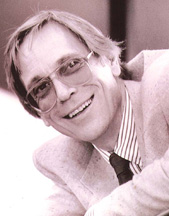1945 – 2010
Leader and advocate for community-based services
For John Wedemeyer, Jr., social work was simply in the genes. After all, his father was the director of the California State Department of Social Welfare. Inspired early on by the profession’s potential to improve the human condition, Wedemeyer decided to enter social work, too.
Born in Olympia, Washington, in 1945, Wedemeyer received his bachelor’s degree in political science from the University of California, Davis in 1967 and his MSW with an emphasis in administration and community organization in 1969 from San Diego State University.
He was a key leader in the formation of two important community agencies in the 1970s’San Diego Youth Services and the Community Congress of San Diego. As founding executive director of San Diego Youth Services, Wedemeyer built an agency that has served a total of 500,000 homeless and at-risk youth at 16 locations in the San Diego area.
One of the few MSWs in the community-based sector in the 1970s, Wedemeyer was an influential broker and advocate for policy changes. His role was essential in meeting the newly emerging issues and needs the traditional human services sector could not adequately address.
Wedemeyer’s efforts resulted in a significant portion of the San Diego County Federal Revenue Sharing funding. Since its inception in 1972, these funds have been distributed to community-based agencies for human services. He testified at a U.S. Senate subcommittee in 1972 regarding the need for services for runaways. His expertise and advocacy were utilized to draft the Runaway Youth Act. In 1985, he became director of The June Burnett Institute for Children, Youth, and Families at San Diego State University, where he managed a number of federal, state, and local grants and contracts and enhanced university-community collaborations.
Wedemeyer joined the National Association of Social Workers in 1969 and the Academy of Certified Social Workers in 1971. He received a Lifetime Achievement Award from Region E NASW, which recognized him as one of a small number of social workers active in the alternate-agency movement of the late 1960s and 1970s.
